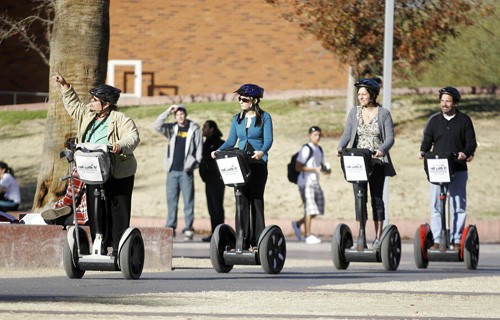This weekend, a record 300 health care students and professionals will flock to the UA for the Ninth Annual Women’s Mental Health Symposium.
The conference works to bring to light the mental health needs of women but is not limited to women and addresses issues affecting both genders.
Nearly 20 different topics will be covered at the event with speakers discussing food’s effect on mood, self-treatment of depression with yoga and emotional differences between men and women.
“”There’s a topic here that relates to something that’s going to be happening in your life,”” said Mary Dickinson, an administrator of professional development in psychiatry at the UA who is coordinating the event.
“”One way or another, one of these topics is definitely going to impact every single person,”” she said.
The bulk of the symposium will be the five simultaneous breakout sessions tracked to cover certain topics with professional lecturers and Q&As.
The full day event will start with an award presentation for the Heroes in Women’s Mental Health, given to two Tucson women nominated for their work in the medical field.
Barbara E. Pritchard, a clinical psychologist and an associate professor at the UA, is the keynote speaker focusing on borderline personality disorders in women, a topic selected by past symposium attendees.
“”The symposium provides an opportunity for professionals to get exposed in terms of information that’s helpful to them in a variety of topics,”” Pritchard said. She said that students in psychology, medicine or nursing would find it especially helpful.
Pritchard said that this symposium is comparable to others she has participated in and that there are some notable benefits to attendance.
“”Instead of people who attend having to pore through research and updates, what happens is that the presenters have done that on their behalf,”” she said. “”They get a relatively balanced and unbiased presentation that facilitates their learning.””
Dr. Victoria Maizes, executive director of the Arizona Center for Integrative Medicine and an associate professor of clinical medicine at the UA, agrees with many of Pritchard’s assertions. Maizes, whose involvement with the symposium stretches back for years, will speak on the interplay between food and mood.
“”It has a broad array of important topics … and it’s a great way to spend a day if you have an interest in this area,”” Maizes said.
Thirteen of the lecturers for the symposium are from the university, joining several others with professional degrees from various medical schools around the nation.
The symposium works to afford various educational opportunities at intermediate levels for students and advanced levels where credits can be earned for health care professionals, said Jean Spinelli, Arizona Health Sciences Center spokesperson.
In the daylong event, a continental breakfast and lunch will be served as well as research materials for speakers in the different sections, all of which is covered by admission price, Dickinson said.
“”We have such great experts here at the University of Arizona and they are imparting their knowledge on us at this really great conference,”” said Dickinson.









